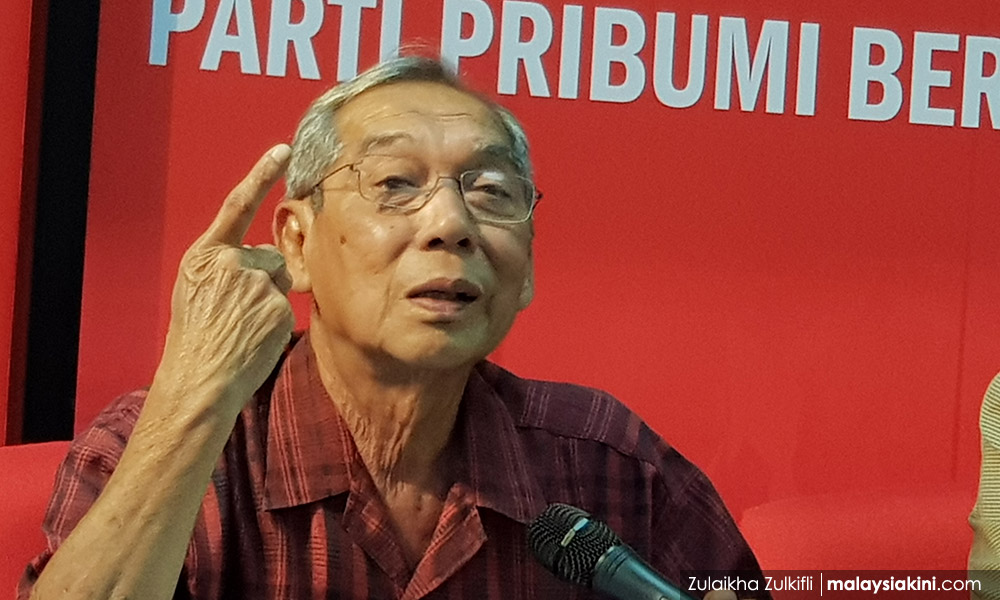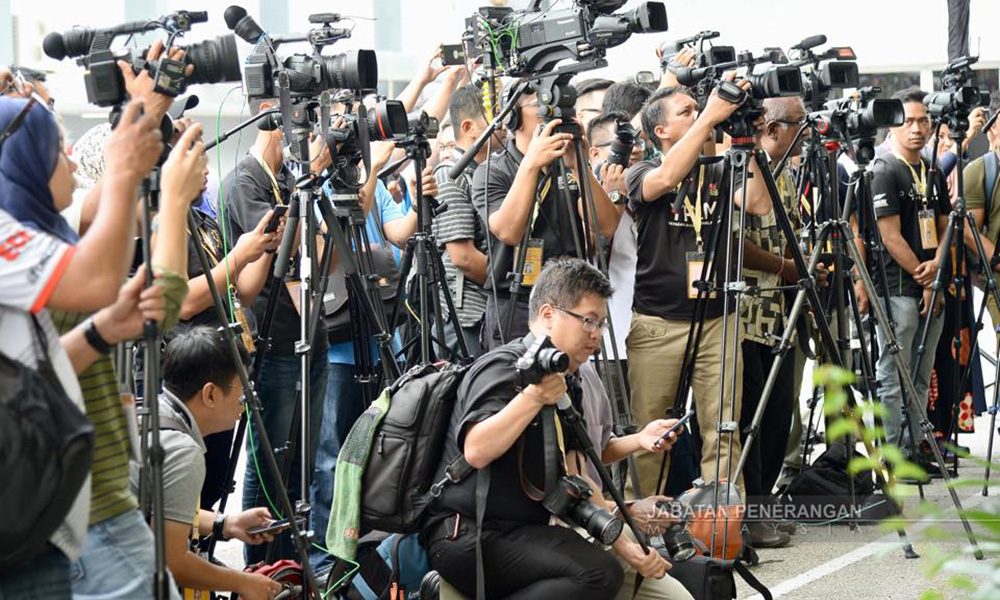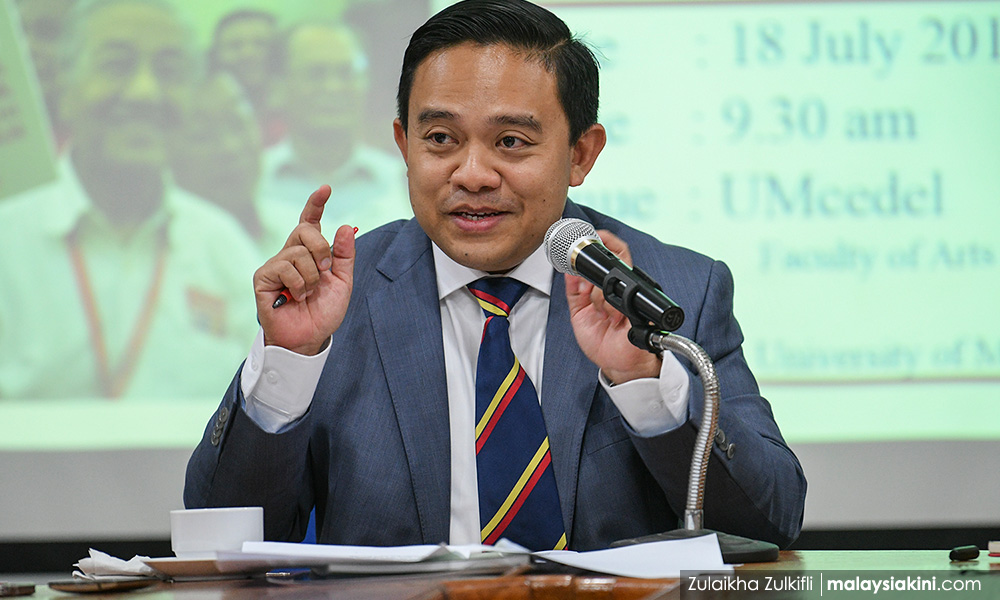
Let’s reflect on the concept of political parties and membership therein in Malaysia.
The context, of course, is the standing ovation received by Bersatu vice-president and former Elections Commission chairperson Abdul Rashid Abdul Rahman for his suggestion: "In the election, we must win by hook or by crook.
Rashid said although he did not like the idea of using government resources, it had to be done.
"All division chiefs should be given activities so that they can have the opportunity to defend their divisions," he said.
In his speech, Rashid also urged the government to restore the parallel village chief systems practised by the previous BN government.
"And our people must occupy these positions," he said.
How useful are political operatives?
I would imagine most Malaysiakini readers found Rashid’s statement abhorrent and repugnant; I also imagine most readers also voted for Harapan.
How then, can we account for this standing ovation?
Needless to say, those clapping the loudest were the ones imagining themselves benefiting the most from a return to this system of feudal patronage.
It is true that political operatives can benefit a lot; but the question is, will Malaysians benefit as a whole?
What this question fundamentally boils down to is: of what value is the local political operative to Malaysia in the 21st Century?
Certainly, there may have been a time where such operatives were a big factor in influencing local votes. Are they today?
Do we imagine that even in rural Malaysia, it is the influence of such local operatives in the coffee shops that determine votes?
Of course, this is probably not what Rashid was talking about.
Differentiating between party and government
Rashid is talking about local political operatives distributing resources in their capacity as party representatives, with a clear expectation of votes in return.

However, here’s the big question: what is it that a political representative can do, that a government representative cannot?
A favourite reminder of mine is: people are not stupid. They know who runs the government, and they can differentiate between the times when BN was in power, versus the time when Harapan is in power.
If the government does its job of protecting the welfare of the rakyat, the rakyat will recognise this. They do not need someone wearing a T-shirt with an oversized Harapan or Bersatu logo handing out goodies to remind them who the government of the day is.
The only people that want you to believe that they do need such a reminder are, firstly, the people who feel that their best income in life is to be made by wearing a T-shirt with an oversized political logo while handing out goodies; and secondly, the people who are too old to understand that politics has changed.
It is the government’s job to care for the welfare of the people; and it is the opposition’s job to keep the government honest and provide alternative ideas when necessary. The government is perfectly capable of doing its job as the government, it does not need to keep changing between multiple hats.
Mass media more influential than foot soldiers
Perhaps the boldest question this article might seek to ask is: do we truly need political parties to be organised the way they have been all this while?
This format and structure of political parties began at a time when one really needed hands and feet on the ground to distribute pamphlets and fly flags because those were the primary avenues of information distribution.

This quite simply isn’t the case today. A political party’s ability to influence perception and win votes is no longer in any way proportional to the number of members it has. Mass media and the internet have changed all that forever.
In Malaysia, where political ideology plays such a small role in the major parties, joining a party is also no longer primarily about promoting a specific agenda.
Indeed, for most major political parties in Malaysia, the only ‘value’ of joining a political party is either to pursue a political career, to reap some sort of personal benefit or to be able to vote in the party elections.
Party infighting causes a huge drain
The last of these is particularly significant. In the Westminster system that we use, one essentially cannot become prime minister without first becoming the leader of the party in power.
This means that as far as becoming prime minister goes, winning the party elections is at least as important as winning the national elections.
This is why, in recent decades, some of the biggest political bloodbaths have not been general elections, but Umno elections.
A lot of time, energy and money go into these party elections. Most of that money is spent on what are essentially bribes to party members or division delegates in exchange for votes.
The entire Umno system, which is what Rashid wants to revive, is based on this feudal pyramid.
If you can feed enough money to your political underlings in their local divisions, you can ensure their votes for you in the party elections.
Post member-based politics
This is the most prominent role I can think of that is played by members in a political party.
Is it a valuable role?
In a Malaysia, where political ideology is probably only a major factor in PAS and PSM, is it healthy for various factions to race to recruit members for the sole purpose of winning more votes in party elections?
Can such a culture give rise to cases like the spikes in membership, such as in the Julau PKR division in Sarawak?
Given the state of the mass media, many functions performed by party members during elections (held only once every five years) can be fulfilled by simply giving candidates ethical access to mass media platforms, which will ensure their voice and messages are heard.
I think if we are bold enough to think outside the box, we might entertain the hypothesis that it is not healthy in today’s Malaysia to give members of political parties the exclusive right to so heavily influence who a coalition’s top electoral candidates are.
Needless to say, this is a controversial and complex line of thinking, full of technical details that would need to be sorted out - not least of which for parties that have certain exclusive criteria for membership.
At its core, though, the idea is that given the changing nature of political priorities and political movements, the current concept of membership in Malaysian political parties may do more harm than good.
When members instigate corruption
Rashid’s recent suggestions are of course a perfect example of how things can go wrong when we use the old system.
The standing ovation he received essentially indicates that many joined Bersatu with the expectation of doing things the old Umno way.

The most recent controversy involving Bersatu Perlis and PTPTN chairperson Wan Saiful Wan Jan (photo) is yet another alarming indicator of this trend.
If this continues, the Bersatu leadership may then feel the pressure of ‘feeding’ these members, lest they are replaced in the party elections by leaders who will.
If they give in to this pressure, then we begin the slippery slope that leads inevitably to full-scale corruption - which is exactly what scuttled Prime Minister Dr Mahathir Mohamad’s attempt to create genuine Malay progress during his first stint as prime minister.
We recall the saying ‘Sebab nila setitik, rosak susu sebelanga’ (because of a single drop of indigo dye, the whole pot of milk is spoiled).
Once again we ask: if the downside of having so many members in a party is the pressure to engage in corrupt practices, where exactly is the upside?
What value do these members truly bring to the table, in exchange for their power to determine who does or does not get to run for highest public office?
Open primaries
I think in the grand scheme of things, the answer is: little or nothing.
While structural change on this scale is difficult, I think it is not too early to start thinking about ways to innovate, so as to create better incentive structures - the end goal being to help the best quality of leaders rise to the top.
In this instance, we could perhaps look at the system used in the United States to determine which individual from a party is chosen as a candidate for election.
The rules for these primaries, as they’re called, vary from state to state.
Some states have traditionally closed primaries, where say only registered Republicans can vote in the Republican primaries.
In some states with open primaries, a registered voter can vote in any party primary, regardless of his or her political affiliation (or lack thereof).
At the furthest end of the spectrum are nonpartisan blanket primaries, where ‘the ballot is not restricted to candidates from one party, (and) the top two candidates advance to the general election regardless of party affiliation’.
Empowering ordinary Malaysians
It would seem that relatively few Malaysians, especially in urban areas, are members of political parties. A straw poll among your friends is likely to indicate this.
The types of more open primaries described above would allow many more Malaysians to take a more active part in important political processes, without having to go through the hassle (or in some cases stigma) of formally joining a political party.
I think the most important end results will be less internal politicking (which is a distraction and an immense drain on energy and resources), and incentivising politicians to focus on greater overall performance, instead of playing to the narrow interests of political party members.
Needless to say, a lot of technical details would need to be worked out, but I feel that we should not underestimate the vast ways in which this can improve the quality of politics in Malaysia.
We could easily see a serious dip in political corruption, as it is much harder to bribe millions of Malaysians, than a few hundred voting delegates.
We could also see a movement away from the more divisive ideologies that tend to appeal to extremists within a particular party towards a more moderate centre.
Unless we commit to some fundamental changes, we are likely to see more politics as usual, and an endless repeat of history.
Wouldn’t some new politics be a better fit for our New Malaysia?
NATHANIEL TAN believes that fortune favours the bold. He will soon be embarking on a new chapter. - Mkini



No comments:
Post a Comment
Note: Only a member of this blog may post a comment.